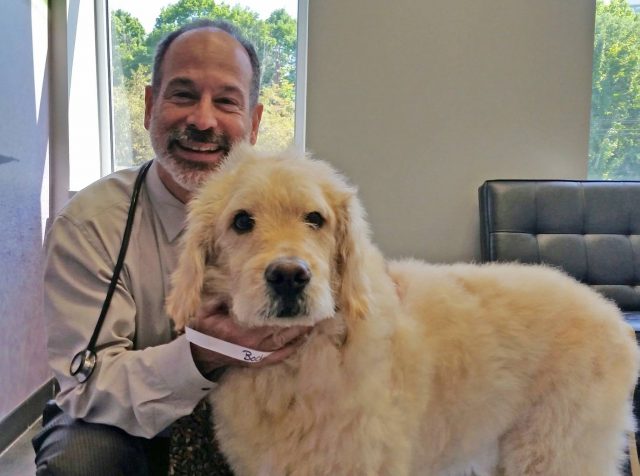The short answer is YES, there is hope if your dog has Lymphoma.
Cancer is a group of unhealthy cells that either stay in one place (benign tumors) or spread throughout the body (malignant). Lymphoma is one of the most common forms of cancer in dogs.
According to an article on PETMD.com, cancer, including lymphoma, will usually be diagnosed by a vet via blood tests, MRIs, ultrasounds, and biopsies. More invasive tools, such as surgeries, are sometimes used to determine the stage (or severity) of cancer once diagnosed.
In the intensive scary world of canine oncology, a lymphoma diagnosis does NOT have to be considered a “death sentence.” Treatment is now available that can extend your dog’s life from a few months to potentially many years. Though the initial diagnosis may be a devastating blow, knowing your dog’s options can be the best way to overcome the illness.
If you need a big boost of hope, check out the survival stories from the National Canine Cancer Foundation website, see Bocker’s story here and check out Ty’s personal journey below and the excellent information on Some Pets.
Could My Dog Have Cancer?

Weight loss, loss of appetite, weakness, signs of pain, and lumps under the skin can all be signals of potential cancer. Kilo’s best friend Stanley suddenly started really slowing down on our ravine walks and had a fast growing lump under the skin. The earlier your dog is diagnosed, the better the possible outcomes with treatment. It is always a good idea to keep up with vet visits, especially if your dog is elderly as age is a huge risk factor for illness. Certain dog breeds may be more susceptible to certain types of cancer, so it is ideal to check for breed specific issues throughout the lifespan of your pet.
What is Lymphoma?
The National Canine Cancer Foundation has stated that lymphoma is one of the most common varieties of canine cancer with Bulldogs, Basset Hounds, Boxers, St. Bernards, and Scottish Terriers being at the highest risk of developing it. Affected dogs are usually middle-aged (7-9 years old) to elderly, although cases with younger dogs have been documented. There are five stages of the development of cancer, ranging from a single lymph node being affected (Stage 1), to the entire central nervous system including the cortical structures (Stage 5). Each stage will present with varying symptoms from weakness to general lethargy and confusion.
Lymphoma is a severe cancer type that can be hard to treat due to its relation to the immune system and white blood cells. When white blood cells are affected, they travel throughout the body in the circulatory system which can cause the cancer to spread quickly. The name “Lymphoma” comes from the type of white blood cell affected, known as a “lymphocyte.” Lymphocytes are broken down into T-cells and B-cells. T-cells signal the need for backup when they encounter a virus or harmful substance in the body. B-cells are responsible for targeting and killing the foreign material. Lymphoma can affect T-cells, B-cells, or both. The type of cell that is affected will distinguish what type of lymphoma your dog may have.
The breed, sex, stage of cancer, type of lymphocyte affected, and age of your dog may be influencing factors that help to determine their survival after the diagnosis, as well as your treatment plan. For example, spayed females typically have a better prognosis apparently.
Types of Lymphoma and what that means for your dog
There are over 30 subtypes of lymphoma, but these are the 5 most common according to the National Canine Cancer Foundation along with their general prognosis:
Multi centric lymphoma: Affects the external lymph nodes. Chemotherapy can cause remission in up to 90% of patients with survival time a median of 12 months (remember many of the dogs affected may be seniors). In 20% of cases, dogs continue to live for up to or even more than 2 years. Other newer treatments appear to be improving survival rates even further.
Alimentary lymphoma: Affects the gastrointestinal tract. Responds to treatment in about 90% of cases, with dogs usually living for an additional year or more.
Mediastinal lymphoma and Cutaneous lymphoma: Affects lymph nodes in the chest and around the lungs (mediastinal) or the skin (cutaneous). A fairly rare T-cell lymphoma, about 40% of treated cases responded to treatment with a wide variety of survival time due to the mixed complications from several months to over a year. This was what ended Kilo’s friend senior dog Stanley the Border Terrier’s life too soon.
Extranodal lymphoma: Very rare, affects a variety of body tissue including the eyes and organs. Local radiation therapy is usually used, though little research has been done on survival time.

Available treatments and outcomes
First of all, find a vet or vets you trust and do your research. Untreated, a vet will usually give the prognosis of 2 months and treatment can extend this to 12 months or more in many cases. Some dogs respond remarkably well to treatment and have their lives extended by years. Each dog is different. Their age, treatment plans, type of disease, stage of disease, and results may vary significantly, so there is absolutely room for hope.
Choosing a Treatment Plan for Lymphoma can be very daunting and expensive. It may include chemotherapy, radiation, prednisone, pain management, surgery, and natural holistic care or some combination. There are various chemotherapy protocols to choose from and things to be aware of (for example starting on prednisone alone can preclude the use of chemotherapy later). In some cases, new technology like photodynamic therapy or immunotherapy may also be used. There are the new monoclonal antibody treatments (MAb) and T-Cell infusion which we are very excited about.Holistic vets and conventional vets sometimes disagree on diet and the use of various supplements although Hills has done some promising studies on the benefits of a high protein/fats and low carb diet.
According to the Purdue University Veterinary School’s publications on lymphoma and canine cancer, surgery is often used for individual tumors, where the growth can be removed easily to alleviate local symptoms for example in the Cutaneous Lymphoma. Unfortunately, as lymphoma is a cancer of the blood, it is not usually that effective in beating the disease.
Instead, chemotherapy may be used to treat your dog. Canine chemotherapy is relatively safe as the dosage is much smaller than in humans. Although it is not always an absolute cure for the disease, Chemotherapy can be very effective in slowing down the progression of cancer, and can potentially add years to your dog’s life. Typically, an IV treatment of chemotherapy is given to dogs with lymphoma for 25 weeks. Pain management, immuno-treatments, and high-calorie foods may also be a part of your dog’s care.

Working towards a cure with Bocker Labradoodle
Our wonderful friend Bocker Labradoodle, the loveable celebrity therapy dog, was diagnosed with Lymphoma in 2014 aged 11. He did the 25 weeks of chemo therapy plus radiation and kicked cancer’s butt. Sadly, he eventually passed over the rainbow bridge a year ago but the treatment certainly extended his life by more than 2 years so I personally got to enjoy more Bocker kisses and hundreds of thousands of people felt hope and strength through his popular Facebook Page and charitable efforts.

Bocker Labradoodle’s Mom Marie has written a beautiful article for us detailing how she kept hope alive for Bocker through his treatment. Bocker’s story inspires us to know that “No one fights alone.” In memory of Bocker, his mum has been an avid supporter of the Animal Cancer Foundation, a group dedicated to fighting cancer in pets and animals.
Join us in helping this wonderful cause!
We donated 10c total $100 for every new Facebook Like on www.facebook.com/TalentHounds (from 38,365) and every new YouTube Subscriber www.youtube.com/TalentHounds (from 1,690) from July 19th to July 26th. We donated 50% to the Animal Cancer Foundation and 50% to our friend Norman the Scooter Dog’s Go Fund Me – see below.

Ty the Corgi’s Journey to Remission
In May 2015, my good friend Carleen from Some Pets learned that her beloved and extremely cute corgi Ty had lymphoma. “She felt like the world was ending. She was told that her sweet little 6 year old boy suddenly had perhaps as little as a few weeks to live without treatment.” She learned that Ty’s cancer was B cell, which often responds better to chemo treatment. Dogs with B cell lymphoma are also potential candidates for T-cell infusion, which is a very promising new treatment. See her post here for her helpful list of questions to ask.
She decided to do full chemotherapy using the Madison Wisconsin protocol, also known as CHOP. This is an intensive protocol that is also the most expensive, but it also has the best remission and survival rates. She later became enrolled in the Canine T-Cell Infusion Project, which is a new immunotherapy treatment that offers the potential for a very long or permanent remission for dogs with B cell lymphoma. Follow Ty’s process with that here. He is in remission and just passed 2 years- woohoo!!!
Here is her list of the resources that she found most helpful when dealing with the personal decisions around diet, supplements, treatment and options, and her resources for personal stories of hope and financial support like Paws 4 a Cure, an organization that she recently donated to, and Magic Bullet Fund.
Norman the Scooter Dog is on his journey
Our talented friend Norman the Scooter Dog was diagnosed with Stage IV lymphoma and told the only chance for a possible cure was to do chemo and then a bone marrow transplant. He underwent treatment including chemo with oncologist Dr Terrance Hamilton at BluePearl Veterinary Partners
We donated to his Go Fund me campaign.
Making the most out of your time together
As Purdue University mentions, chemotherapy is not for every dog. For some pet parents, the idea of putting an elderly dog through intensive treatment can be unappealing. In this case, palliative care may be the preferable option. With pain management, an elderly dog with lymphoma can live out a happy last few months with their owner until it’s time to cross the rainbow bridge. Time can be taken to play the dog’s favorite games, give them their favorite treats, and spend lots of quality time together. The memories from this time are extremely meaningful and should be cherished.
Stanley did initial treatment but did not react well or improve. At 12 years old, he did not continue. He had the best last few months with family and went peacefully in his Dad’s arms.
If you’re struggling with a sick pet, it is never easy to know when to keep fighting and when to let go. Grief consultant Marybeth Haines has done two incredible guest posts for us. One about How to know when it’s time to say goodbye to your pet and How to deal with loss.


Looks like well put “commercial” pritching for debilitating chemothetherapy.
Probably getting paid by “Big Farma”. Pretty shameful to use emotionally broke and desperate pet owners.
This is not an ad it is a true story? No one was paid. Everyone has to make their own decision about chemo. It is very debilitating and expensive but it can extend life in many cases (my own mother just went through chemo for lymphoma and is now in remission as of last week- woohoo- she would have died in April without). I agree it is shameful to exploit anyone, and it can be a tough decision, but I also understand why people choose or recommend chemo.
I have a Beagle who is 12 yrs old, she was diagnose with Lymphoma in Aug/2018. I noticed a lump in her neck and when we went to the vet he felt lumps all through her on her Lymph Nodes. I refused to have a biopsy done for fear of it causing the cancer to spread when air would enter her body for it has been know to cause cancer to spread faster.. I could not afford Chemo so we started her on prednisone. She is checked every month and everything has disappeared except for the lump in her neck. At first she did loose a little weight but we started adding a little more at feeding time and she has gain some weight back. She just surpassed her 1 yr. I questioned the Vet on the diagnose and he is 100% sure and he said yes for he has been a vet for a long time and knows the difference in how they feel. We are calling her our miracle dog and I said to the Vet that as long as there is food involved she will be with us for a long time for everyone knows how Beagles love to eat. We are now cutting her prednisone dosage down to see what happens. I know of a lot of beagles that have been diagnose with the same cancer and they had biopsies done and within weeks to months they crossed over. I do a lot of praying for her and so does my friends & family. Miss Motley is the oldest of our 4 beagles and she is also the Drama Diva Queen. Is it possible that she has beaten this cancer and is in a low stage of it. I myself is a survival of cancer.
I am so glad that your wonderful Miss Motley is doing well on Prednisone. I am not a vet or a doctor but I believe it is possible that the Prednisone slowed or reduced the lymphoma symptoms (my Mom actually took it before and then with other chemo for her lymphoma and it sure helped- she is now in remission so stands to reason it could work for dogs). Sounds like you have done the best for her quality of life, especially at that age – chemo would have been brutal and no guarrantees. Positive thoughts to you and your Beagles and hopefully she will coninue to beat the cancer. X Susie
Wow that was good news and encouraging. My shitzu was diagnosed with lymphoma on her neck just 2 days back and I’m not into myself crying I will ask for a second opinion with another vet .. I don’t know what to do I’m doing lots of reading now about this and hopefully my baby will survive for more time.. did you get her any special diet for her food ? This is my email :firecresr07@yahoo.com
Thank you and god bless
Claire
My bichon-poo, Coco, was diagnosed with Lymphoma on January 21st after I noticed some weight loss and being picky with her regular food. She is 12 yrs old.
I am devastated beyond words! I can’t afford the chemo so the vet suggested Prednisone. She seems to be eating more and is quite happy! I pray she will go into remission ❤️ I’m not ready to part with her. She is a smart loving gal. My fur baby!
I am so sorry. Sending positive vibes. I have seen Prednisone improve Lymphoma situation in humans myself (my Mom) and certainly delay any bad outcomes in both dogs and humans. I think you are wise to avoid chemo at 12 and hope for you both to enjoy more happy time together. Hugs Susie and Kilo the Pug.
Hi Trana,
I just read your post and am wondering how Coco is doing? Our 15 y/o Shichon, Sophie, was diagnosed in mid-April. We initially opted out of chemo, due to her age, and started her on prednisone. She was going downhill fast. Right before Memorial Day I discovered a new oral chemo, Laverdia CA1, that was approved for use in January, 2021. I called my vet and, although he was not familiar with Laverdia , he quickly called to to find out details. We gave Sophie her first dose on June 1st and she has bounced back remarkably. She has not had any side effects and started eating without needing Entyce to stimulate her appetite. I don’t have any unrealistic expectations, but for now she is doing great. The lymphoma hit her quickly and this has given my 4 daughters and myself an opportunity to spend quality time with her, if only for a short time. We love her very much. I wish I would have known about Laverdia when she was 1st diagnosed.
I am using liquid vitamin C with other herbs and her lymph nodes have gotten smaller. I am in my 2nd month of Lymphoma diagnosis and have not gone the chemotherapy route. I am doing a homemade diet and working with a holisitc vet.
Wishing you all the best. Our hearts are with you and let us know how you are going.
I am in 7th month still working holisitcally with my pup. I have been doing my own research. My pup has had ups and downs but this week is an up.
Hi Sylvia!
I just posted my story responding to Trina’s post. I am interested in learning about the holistic treatments you are using. Your success is so exciting.
Can you tell me what other herbs? I cannot afford chemo, I can’t imagine Dixie not here. Did you do lymph massages?
What dosage are you using of the liquid Vitamin C?
My Maltese mix is only 10 years old and has lymphoma! We are living on social security and cannot afford chemo. He is on prednisone and all he does is sleep. Dr has him on meds to have him eat as he wasn’t eating. Now eating and still goes for a couple walks every day! He is our life and we just do not want him to suffer. So far I don’t think he is at all. Please should we be doing any more to help him? Thank you so much. Agnes Waterman
I am so sorry. If he is not suffering that is good. Hopefully the prednisone is helping. I think there are foundations that help pay for medical expenses as chemo is very expensive I believe.
Quick question we started out 7yr old mixed breed pit and mastiff with chemo 3weeks now,his first dose he came home normal but his second one he can’t walk,1of his back leg for some reason is giving him real pain,we have to spoon feed him with liquid food and give him ensure.I have never saw my dog in so much pain and it hurts me to know that he is in so much that the pain kill ain’t helping him,so my question is.is this normal?and how long will be be like this?or am I have to do something this I never thought I will have to do and put him down cause that one will kill me .
I am so sorry to hear this. I am not sure what could be causing the pain. Can you ask your vet and look at pain relief? Sending best wishes.
Ive been fighting Lyphoma in my boxer for the last couple months. He only 4.5 years old. This morning he fainted twice in 10 minutes. He has been on Prednisone for the last couple months. If i miss a day with the pill the lumps under his chin will increase in size. Im thinking the time for him to move on is near. The vet took the first test and messed it up then had to do the same test again for the oncology. That costed me 1000 for both tests together. Then they wanted me to do a consultation with oncology doctors costing 200. If i go with cemo it would cost upwards to 5000 with no guarantee. Poor little guy…… Im just going to have to let mother nature take her toll.
Its not easy by any means to let him go. Theres just some things in life that we cannot control. God please take care of my little man
Hello.my 11 yr. old Boxer was diagnosed with Lymphoma and has been on a regament of Predisone along with a acid reducer,Pepcid. Massive reduction in size of lympnodes under jaw and throat. She is in remission but her Vet said this will be a life long drug for her. Thank You all for the info…GOD bless
I just received a lymphoma diagnosis on my 9 yr old spayed female boxer. We started her on a brand new drug, laverdia -Ca1 this past Tuesday. She will take this medicine twice a day.
The studies are amazing, I’m praying this is the new answer!!! A ton cheaper than chemo, can be administered at home, there are many safety measures but they are so worth it.
My shih-tzu is 11 years old and has lymphoma. I opted out of chemo and instead went with prednisone. He has been in remission for 6 months. I think the combination of prednisone and the abundance of fish oil in his diet, Farmer Dog food, has been a life saver for my little boy. He is so happy right now, so my plan is to treat the cancer as a chronic disease; if or when the cancer returns, I’ll try another drug.
So glad he is happy.